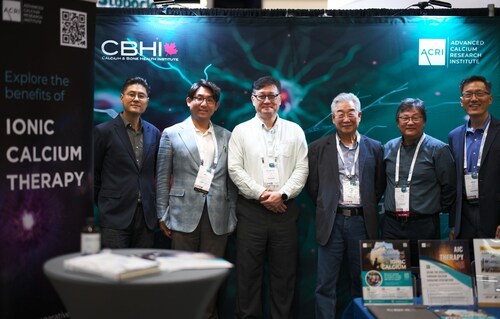First Human Clinical Study of Sigma Anti-Bonding Calcium Confirms Statistically Robust Gains in T-Scores and BMD
VANCOUVER, BC, Oct. 29, 2025 /PRNewswire-PRWeb/ -- The Calcium and Bone Health Institute (CBHI) today announced peer-reviewed human evidence showing that Sigma Anti-Bonding Calcium Carbonate (SAC) produces clinically meaningful gains in bone mineral density among older Asian adults at risk for osteoporosis. The findings were published on October 6, 2025, in the Journal of Family Medicine and Primary Care Open Access.
In this first human evaluation of SAC, 82 Asian adults—classified as normal, osteopenic, or osteoporotic at baseline—were given daily SAC for ~8 months. Bone parameters were assessed at the distal radius using quantitative ultrasound. Results demonstrated statistically significant improvements across all endpoints:
- T-score: −2.01 → −0.85 (p<0.0001)
- BMD: 0.95 → 1.10 g/cm² (p<0.0001)
- Speed of Sound (SOS): 3,946 → 4,079 (p<0.0001)
Clinical reclassification outcomes were equally notable:
- 65% of osteopenia participants (20/31) normalized
- 64% of osteoporosis participants (21/33) improved to osteopenia
- 12% of osteoporosis participants (4/33) achieved full normalization
"These data validate a decade of observational evidence," said Dr. Paul K. Lee, President of CBHI and co-corresponding author. "SAC reliably elevates ionized calcium and initiates bone-building activity without the gastrointestinal liabilities or absorption limitations of traditional calcium."
Lead and co-corresponding author Dr. Jong Y. Park at Moffitt Cancer Center emphasized population relevance: "Asian adults carry a disproportionate global burden of osteoporosis due to physiologic, dietary, and anthropometric profiles. A safe, non-pharmacologic intervention with this degree of effect has clear public health implications."
Co-author Dr. Donghoon Yoon at University of Arkansas for Medical Sciences added: "The consistency of improvement across age, gender, and severity strata is uncommon. SAC represents a distinct category of calcium therapy—one that is physiologically active rather than merely supplemental."
SAC is a proprietary calcium carbonate engineered with a sigma anti-bonding molecular structure, enabling the release of ionic calcium absorbed independently of vitamin D or digestive peptide transport. Prior preclinical work (ovariectomized rat model, 2011) demonstrated osteogenic effects consistent with the mechanism observed here. The current study is the first to reproduce those effects in a human cohort.
About the Calcium and Bone Health Institute (CBHI)
CBHI is a Canadian nonprofit research institute focused on the role of ionic calcium in over 150 degenerative conditions, including osteoporosis, arthritis, Alzheimer's disease, and metabolic disorders. CBHI collaborates with international institutions to advance calcium signaling science and therapeutic translational research.
Media Contact
Alex Lee, Calcium and Bone Health Institute, 1 604-525-1256, [email protected], http://cbhi.info/
SOURCE Calcium and Bone Health Institute



Share this article